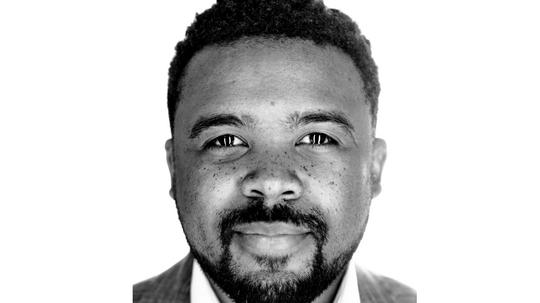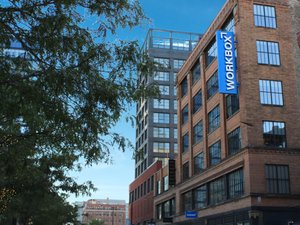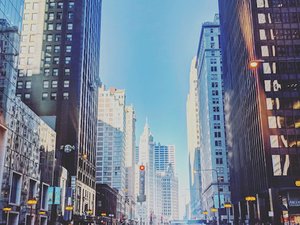
From former Chicago Police Department superintendent Garry McCarthy to local activist Ja’Mal Green, the candidate list for 2019 Chicago mayoral race is already full of notable names. That list now includes tech entrepreneur, educator, and philanthropist Neal Sáles-Griffin.
The CodeNow CEO, with the help of more than 100 campaign members, is running his mayoral campaign out of Basecamp’s West Loop office. In addition to providing a headquarters, Basecamp has donated more than $1,500 to Griffin’s campaign, records show. Though Griffin doesn’t currently have the support of multiple, deep-pocketed donors to support his efforts like incumbent Mayor Rahm Emanuel, who raised $1.7 million in one day, he remains undeterred. Unite Chicago PAC, a West Town-based political action committee, is his biggest donor to date, contributing more than $54,000 to the Hyde Park & Kenwood native’s campaign.
Griffin co-founded The Starer League in 2011. It was one of the country's early coding schools, and it was acquired by Fullstack Academy in 2016. He's also an adjunct professor at Northwestern's McCormick School of Engineering.
Griffin spoke with Chicago Inno about how his tech background prepared him to run for office, what critical issues he wants to address, and why being a political novice makes him the right candidate:
Chicago Inno: What made you decide to run for office?
Neal Sáles-Griffin: We’re not going to solve our problems with the same thinking that created them. When I realized that people are leaving Chicago … people move away because their schools aren’t acceptable enough [for] their kids, because they don’t feel safe, because there are opportunities elsewhere where they can get more for their dollar. When I fully understood why this was happening, and why Chicago isn’t working for a lot of people, it seems really obvious that the way Chicago has been run for too long [by politicians that have] positioned things like getting themselves re-elected and getting campaign contributions, as opposed to doing their best work for Chicagoans while they’re in office. That is the fundamental issue that I’d like to solve.
How will your work experience influence your mayoral campaign and possibly the city?
Before I even get elected, I’m building a model right now to identify exactly how the city works from a budgetary perspective, because that’s the lifeblood of our city … The first step is actually less about my tech [and] entrepreneur background. It’s more about my background as an educator. On my website, I talk about what Chicago should look like nine years from now in 2027. I talk about the tools that I’m already developing right now to make the budget visualized and accessible … That’s just the tip of the iceberg. I have dozens of people who are helping us that I’m collaborating with to build tools and resources that show you how efficient we can make Chicago operate.
A lot of Chicago’s tech innovation is concentrated in tech hubs like 1871. How would you spread tech across the city?
A lot of my students from the South Side want to come downtown and be a part of this, but at the same time, we’ve got to take these resources and these experiences to the communities. And this all comes back to schools … I’m prototyping that right now. I teach at a neighborhood called Walter H. Dyett High School for the Arts. I spend every Monday at 8 a.m. with these kids. And I’m going step by step walking them through the process of learning how to start their own technology businesses, how to build their own app, how to make their own website, identify problems that they want to solve in their community, make money and hopefully reinvest in the community.
Given your tech background, how would you modernize the city’s existing tech systems?
[Conduct] a full audit of city services and understand what we actually need to put in place that’s less about big contracts and long enterprise deals and more radically efficient and thoughtful systems that we can put in place. Those contracts that we’re tied up in—that’s it. You’ve got to follow the money, because without that how is does anything change? How do you hire contractors? How do you hire developers? How do you hire different people to run departments to actually make them more sustainable, more innovative? That’s going to happen unless you have a mind for efficiency and that’s something that I’m bringing with my tech background.
You don’t have as much campaign financing at your disposal as some of your opponents. What has operating with limited funds taught you?
I’ve learned how inaccessible running for office can be for a lot of people, and I’ve learned, unfortunately, how money-oriented this whole thing is and how ridiculous that is. There are so many amazing people out there who would be the greatest public servants that Chicago’s ever seen that can’t even throw their hat into the ring, because they can’t work full-time on a campaign or have access to a wealthy donor network or have the political clout to be part of the inside crew. I’ve had enough of all that. The only way we’re going to break that up … is if somebody like myself steps up and decides to put his neck on the line to bring people along with them to actually make this place better without worrying about power, or money or ego or legacy or all this other stuff that I think motivate too many people in government.
If elected, what are the top two issues you’re looking to address first?
Walking in there, I’m going to immediately work on campaign finance reform so that no longer we’re not going to have to worry about gathering as much money as possible from donors who are wealthy and have special interests in mind. That’s the core. On top of that, there’s a lot I can do in terms of how we’re spending our money, making it more participatory [and] making people have more ownership in the process. We need the most transparent government Chicago’s ever had. The only way we’re going to get that is if we have new people who have no desire to hide things or keep things from you, because they’re coming in from an outside perspective … Right now the inefficiencies are rampant, the corruption is intolerable, and the lack of connection to the communities that most need our help—that’s something that’s not going to change with an insider.
While you have education, nonprofit, and business experience, you lack the formal government experience that some of your opponents possess. What makes you qualified to be mayor?
I’ve had a lot of great experiences in my life with starting businesses and sitting on the board of over 10 nonprofits … I’ve had all these exposures because Chicago’s beautiful. Chicago is vibrant and diverse and rich, but only for some people in certain parts of the city. The real important experience right now for a mayor that Chicago needs is firsthand experience going through the challenges and struggles that the people most in need in our city—they need empathy. They need someone that can speak to those struggles. Those struggles are mine, through my own personal story [and] my upbringing. Having times when we’ve been living paycheck to paycheck. Having times when we’ve struggled … We need people who can relate so that there’s trust.








